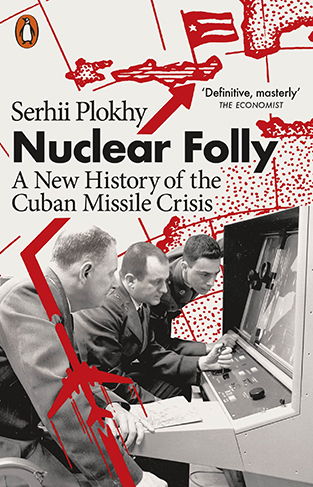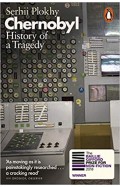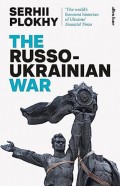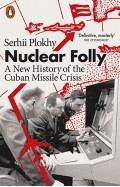Nuclear Folly: A New History of the Cuban Missile Crisis
By: Serhii Plokhy
-
Rs 2,466.75
- Rs 3,795.00
- 35%
You save Rs 1,328.25.
Due to constant currency fluctuation, prices are subject to change with or without notice.
'An enthralling account of a pivotal moment in modern history. . . replete with startling revelations about the deception and mutual suspicion that brought the US and Soviet Union to the brink of Armageddon in October 1962' Martin Chilton, Independent
The definitive new history of the Cuban Missile Crisis from the author of Chernobyl: History of a Tragedy, winner of the Baillie Gifford Prize
For more than four weeks in the autumn of 1962 the world teetered. The consequences of a misplaced step during the Cuban Missile Crisis could not have been more grave. Ash and cinder, famine and fallout; nuclear war between the two most-powerful nations on Earth.
In Nuclear Folly, award-winning historian Serhii Plokhy tells the riveting story of those weeks, tracing the tortuous decision-making and calculated brinkmanship of John F. Kennedy, Nikita Khrushchev and Fidel Castro, and of their advisors and commanders on the ground. More often than not, Plokhy argues, the Americans and Soviets simply misread each other, operating under mutual distrust, second-guesses and false information. Despite all of this, nuclear disaster was avoided thanks to one very human reason: fear.
Drawing on an impressive array of primary sources, including recently declassified KGB files, Plokhy masterfully illustrates the drama of those tense days. Authoritative, fast-paced and unforgettable, this is the definitive new account of the Cold War's most perilous moment.
'An enthralling account of a pivotal moment in modern history. . . replete with startling revelations about the deception and mutual suspicion that brought the US and Soviet Union to the brink of Armageddon in October 1962' Martin Chilton, Independent
The definitive new history of the Cuban Missile Crisis from the author of Chernobyl: History of a Tragedy, winner of the Baillie Gifford Prize
For more than four weeks in the autumn of 1962 the world teetered. The consequences of a misplaced step during the Cuban Missile Crisis could not have been more grave. Ash and cinder, famine and fallout; nuclear war between the two most-powerful nations on Earth.
In Nuclear Folly, award-winning historian Serhii Plokhy tells the riveting story of those weeks, tracing the tortuous decision-making and calculated brinkmanship of John F. Kennedy, Nikita Khrushchev and Fidel Castro, and of their advisors and commanders on the ground. More often than not, Plokhy argues, the Americans and Soviets simply misread each other, operating under mutual distrust, second-guesses and false information. Despite all of this, nuclear disaster was avoided thanks to one very human reason: fear.
Drawing on an impressive array of primary sources, including recently declassified KGB files, Plokhy masterfully illustrates the drama of those tense days. Authoritative, fast-paced and unforgettable, this is the definitive new account of the Cold War's most perilous moment.
The Man with the Poison Gun: A Cold War Spy Story - (HB)
By: Serhii Plokhy
Rs 1,121.25 Rs 1,495.00 Ex Tax :Rs 1,121.25
Chernobyl: History of a Tragedy - Paperback
By: Serhii Plokhy
Rs 1,042.25 Rs 1,895.00 Ex Tax :Rs 1,042.25
The Russo-Ukrainian War: From the bestselling author of Chernobyl
By: Serhii Plokhy
Rs 2,791.75 Rs 4,295.00 Ex Tax :Rs 2,791.75
Nuclear Folly: A New History of the Cuban Missile Crisis
By: Serhii Plokhy
Rs 2,466.75 Rs 3,795.00 Ex Tax :Rs 2,466.75
Zubin Mehta: A Musical Journey (An Authorized Biography)
By: VOID - Bakhtiar K. Dadabhoy
Rs 472.50 Rs 1,050.00 Ex Tax :Rs 472.50
The Origins of Political Order From Prehuman Times to the French RevolutioN
By: Francis Fukuyama
Rs 3,505.50 Rs 3,895.00 Ex Tax :Rs 3,505.50
Manning Up: How the Rise of Women Has Turned Men into Boys
By: Kay Hymowitz
Rs 646.75 Rs 995.00 Ex Tax :Rs 646.75
The Obama Syndrome: Surrender At Home War Abroad
By: Tariq Ali
Rs 1,165.50 Rs 1,295.00 Ex Tax :Rs 1,165.50
The Quest For Meaning: Developing A Philosophy Of Pluralism
By: Tariq Ramadan
Rs 1,255.50 Rs 1,395.00 Ex Tax :Rs 1,255.50
The Pakistan US Conundrum Jihadists The Military And The People The Struggle For Control
By: Yunas Samad
Rs 1,255.50 Rs 1,395.00 Ex Tax :Rs 1,255.50
An Enemy We Created: The Myth Of The Taliban Al Qaeda Merger In Afghanistan 19702010
By: Alex Strick van Linschoten
Rs 3,412.50 Rs 5,250.00 Ex Tax :Rs 3,412.50
WikiLeaks: Inside Julian Assanges War on Secrecy
By: David Leigh & Luke Harding
Rs 552.50 Rs 850.00 Ex Tax :Rs 552.50
No similar books from this author available at the moment.
No recently viewed books available at the moment.
Zubin Mehta: A Musical Journey (An Authorized Biography)
By: VOID - Bakhtiar K. Dadabhoy
Rs 472.50 Rs 1,050.00 Ex Tax :Rs 472.50
The Man with the Poison Gun: A Cold War Spy Story - (HB)
By: Serhii Plokhy
Rs 1,121.25 Rs 1,495.00 Ex Tax :Rs 1,121.25
Chernobyl: History of a Tragedy - Paperback
By: Serhii Plokhy
Rs 1,042.25 Rs 1,895.00 Ex Tax :Rs 1,042.25
The Russo-Ukrainian War: From the bestselling author of Chernobyl
By: Serhii Plokhy
Rs 2,791.75 Rs 4,295.00 Ex Tax :Rs 2,791.75
Nuclear Folly: A New History of the Cuban Missile Crisis
By: Serhii Plokhy
Rs 2,466.75 Rs 3,795.00 Ex Tax :Rs 2,466.75













-120x187.jpg?q6)



-120x187.jpg?q6)





-120x187.jpg?q6)



-120x187.jpg?q6)



